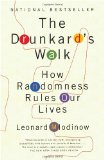Book Review: “The Drunkards Walk: How Randomness Rules our Lives” by Leonard Mlodinow
March 16, 2010
Okay, I confess. I know that A User’s Guide to the Universe edged out The Drunkard’s Walk in this poll about which science title I should read next, but in true me fashion I ended up purchasing all four books. And when the package arrived and I scanned the first pages of each, I found it entirely impossible to put Mlodinow’s fantastic surveying romp through probability, chance and statistics down. I read the first 100 pages in one sitting.
This is the kind of book I unqualifyingly recommend to everyone. Most things I read and like have audience segments. I can’t really recommend Dumas to my friend who really loves YA novels; I don’t think David would be into Jane Austen. But this book? Read it, read it, read it.
All right, I will concede to one factor. I never took statistics. I have an intuitive grasp on probability and have taken calculus, but my mathematic foundation is not the best and is beset by termites. So it is feasible that Mlodinow’s explanations of the rules of probability–refreshingly clear and concise–might not be quite as “ah-ha!” to every reader. But the relevant examples and stories and narrative are first-rate across the board.
Mlodinow’s thesis shines a light on the common fallacies we, due to inherent human nature, make. He covers human weaknesses in recognizing and generating random data, assigning astronomical odds to something seemingly miraculous, believing in our ability to “beat the market”, falling victim to confimation biases and otherwise looking for pattern and control when there is none or we have none.
Along the way we get to re-visit with my personal bugaboo, the “Monty Hall” problem. We see how chance more than anything underlies meteoric success streaks for sports figures, actors, and writers. We get to know (sometimes in a bit too much depth) about the lives of the mathematicians who figured this stuff out, from Platonic Greece to modern times.
Though Mlodinow’s argument never wavers–chance, and chance alone, dictate far more of the outcomes in our lives and world than we generally realize–he manages to deliver this potentially depressing argument with a sincere dollop of hope, urging us to remember that it’s the stubborn and the perservering who leave a mark of genius on this world.
Mlodinow tells us about John Kennedy Toole, who wrote the novel A Confederacy of Dunces. Toole never lived to see his book published: he killed himself after the 11th rejection notice. His mother kept at it, and ultimately it was published, posthumously. It sold like hotcakes and won the Pulitzer Prize. This, specifically, is meaningful to me. After all, my signature cry of “My tubes!” during bouts of Crohn’s ickiness is derived directly from protagonist Ignatius Reilly’s bellow: “My Valve!” To think that the world could exist without such farcical genius makes the notion of “don’t quit” more powerful.
Get the Book!
Buy the books mentioned in this post from Amazon.com now and help me maintain my rock 'n roll lifestyle.
Related Posts
- Book Review: “The Best American Science Writing 2009″ ed. Natalie Angier
March 25, 2010 - Book Review: "Anathem" by Neal Stephenson
January 8, 2009 - Book Review: “BFG” by Roald Dahl
January 4, 2010 - Reader Question: Help me choose my next science title!
March 4, 2010 - Book Review: "What we Believe but Cannot Prove: Science in the Age of Certainty", Edited by John Brockman
August 22, 2008

